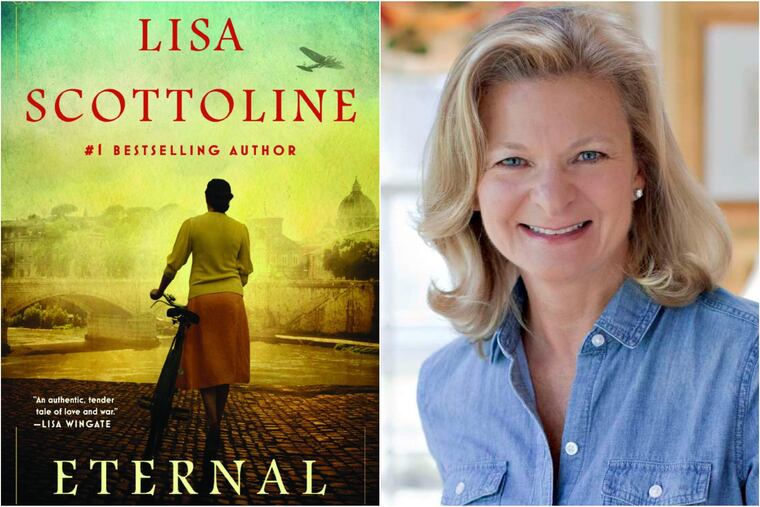Lisa Scottoline’s ‘Eternal’ explores teens’ lives as Fascism takes over 1930s Italy | Book review
The Philadelphia author's latest book is a welcome addition to the growing list of history-based novels about everyday people, especially women, who did what they could to defeat the Third Reich.

Eternal
By Lisa Scottoline
Putnam, 480 pp. $28
Reviewed by Carol Memmott
Best known for her female-centric legal thrillers, novelist and Philadelphia Inquirer columnist Lisa Scottoline has, over more than 30 books, dealt with issues of family, justice, and honor. Her new book, Eternal, tackles many of those same subjects, through a different lens. Set in Italy before and during World War II, the book is an accomplished historical novel that is both steeped in period detail and full of relatable characters — a welcome addition to the growing list of history-based novels about everyday people, especially women, who did what they could to defeat the Third Reich.
Eternal begins in May 1937 when teenagers Elisabetta D’Orfeo, Sandro Simone, and Marco Terrizzi are living simple lives in Rome. Elisabetta, who cares for her alcoholic father and works as a waitress, dreams of becoming a novelist. Sandro lives with his prosperous parents and sister in the Roman ghetto where Jews have lived for centuries. Marco’s family runs a successful bar and restaurant. Sandro and Marco are besotted with Elisabetta, who has feelings for both, but getting married doesn’t interest her.
Life seems ideal, yet beneath the surface, a moral storm is brewing. Through these characters we watch as a nation comes to terms with Fascism and anti-Semitism, and desperate families deal with food shortages, assaults, and the loss of loved ones. Elisabetta is just one of the novel’s many strong female characters who perform countless acts of heroism in aid of family, friends, and country. It’s all set against Benito Mussolini’s rise to power.
Marco and his father are devoted to Mussolini, and Marco exclaims during a heated agreement about the charismatic leader that “Mussolini is always right.” It is this blind faith that allows many Italians to willingly follow the man who will eventually side with Hitler and subjugate Italy’s Jews under race laws that deprive them of their livelihoods and citizenship.
Through Sandro’s family, we watch the horrors of the race laws unfold. Scottoline assuredly recounts the cruelty they suffer as the Nazis mistreat and taunt them. In scenes based on actual events, Scottoline draws us into their pain. In one scene, Nazis invade the ghetto’s synagogue and begin mishandling sacred texts and manuscripts. As they toss precious antiquities out the synagogue’s windows, they laugh as the Jews scramble to catch them before they hit the ground. In another incident, the Jews are told they have 36 hours to hand over 50 kilograms of gold or 200 members of their community will be arrested. Although the Jews and their supporters are able to collect the gold, the rastrellamento of thousands of Jews happens anyway.
Scottoline is a master at ramping up the suspense, and in Eternal she delivers a slow build of hate and violence culminating in a nail-biting scene at the transit camp where Jews are being held before they are shipped to Auschwitz.
Scottoline has said that some of the inspiration for this novel came from Philip Roth, with whom she took a writing seminar, “The Literature of the Holocaust,” at the University of Pennsylvania. Roth taught her, she writes, “that whether your subject is as weighty as the Holocaust or as apparently mundane as domestic life, you have to tell it true.” It’s a maxim that has imbued Scottoline’s novels with authenticity and relevance ever since her first, Everywhere That Mary Went, was published in 1994.
From the Washington Post.